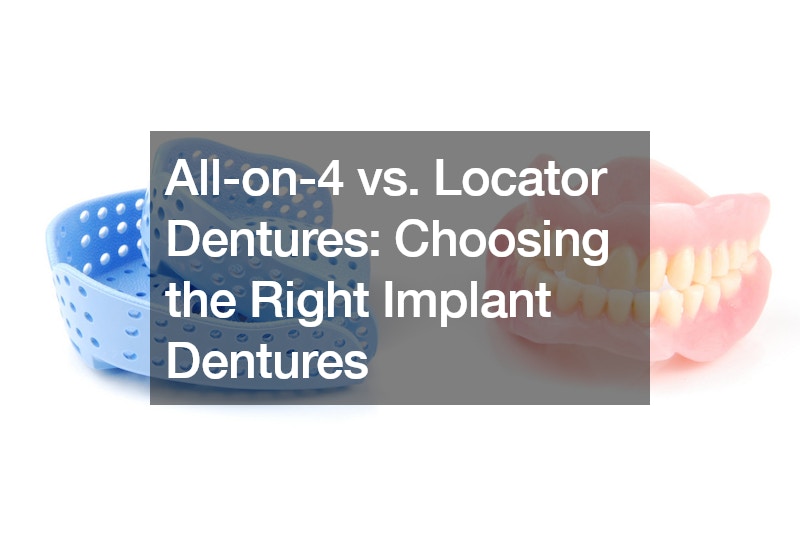
When it comes to restoring a smile and regaining confidence, implant-supported dentures offer a promising solution for those with missing teeth. Among the array of options available, two popular choices stand out: the All-on-4 implant dentures and locator dentures. Understanding the differences between these options is crucial for making an informed decision about which implant denture option best suits individual needs. Let’s delve into the key aspects of each and explore how they compare.
All-on-4 Implant Dentures
The All-on-4 concept revolutionized implant dentistry by offering a comprehensive solution for patients missing all or most of their teeth in a dental arch. Here’s what sets All-on-4 apart:
1. Stability and Reliability
All-on-4 utilizes four strategically placed implants to support a full arch denture. By distributing the biting forces across these implants, stability and reliability are enhanced. The concept of splinting implants together with a bar or through the denture itself ensures that they function as a unit, reducing the risk of individual implant failure.
2. Cost-Effectiveness
Compared to individual implants for each missing tooth, All-on-4 offers a more cost-effective solution without compromising on functionality and aesthetics. With fewer implants required, the overall treatment cost is typically lower, making it an attractive option for many patients.
3. Simplified Procedure
All-on-4 often involves a less complex surgical procedure compared to individual implants, reducing the overall treatment time and minimizing patient discomfort. The streamlined process makes it a viable option for patients seeking a swift and efficient solution to their dental needs.
Locator Dentures
Locator dentures, also known as implant-retained overdentures, offer another alternative for patients seeking stability and improved function. Here’s what sets locator dentures apart:
1. Increased Stability
Locator dentures typically involve the placement of two implants to support a lower denture or four implants for an upper denture. While fewer implants are used compared to All-on-4, locator dentures still provide increased stability and retention compared to traditional dentures. The use of locator attachments allows the denture to snap securely onto the implants, preventing slippage and discomfort during daily activities such as eating and speaking.
2. Versatility
Locator dentures offer a versatile option for patients with varying degrees of bone resorption or anatomical considerations. They can be customized to accommodate individual needs and preferences. The ability to retrofit existing dentures with implant attachments provides a convenient solution for patients who wish to upgrade from traditional dentures to a more stable alternative.
3. Affordability
While locator dentures may require fewer implants compared to All-on-4, they still offer a more affordable option for patients seeking the benefits of implant-supported dentures without the higher cost associated with individual implants.
Choosing the Right Option
When considering All-on-4 vs. locator dentures, several factors come into play, including stability, cost, treatment complexity, and individual patient preferences. Here are some key points to consider:
- Number of Implants: All-on-4 utilizes four implants, providing comprehensive support for a full arch denture. In contrast, locator dentures may involve fewer implants, making them a more suitable option for patients with limited bone volume or financial constraints.
- Treatment Complexity: All-on-4 may require a more extensive surgical procedure compared to locator dentures. Patients should discuss their comfort level and treatment preferences with their dental provider to determine the most suitable option.
- Bone Density: The amount and quality of bone in the jaw play a crucial role in determining the success of dental implants. Patients with sufficient bone volume may be better candidates for All-on-4, which requires four implants for full arch support. However, those with limited bone density may benefit from locator dentures, which can often be placed with fewer implants and may require less invasive procedures such as bone grafting.
- Gum Recession: For patients concerned about aesthetic outcomes, gum recession may be a factor to consider. All-on-4 implants typically provide more comprehensive coverage of the gums, resulting in a natural-looking smile. Conversely, locator dentures may require careful consideration of gum recession and tissue contours to ensure optimal aesthetics.
- Chewing Habits: Patients with strong chewing habits or who consume hard or tough foods regularly may benefit from the added stability provided by All-on-4 implants. The comprehensive support offered by four strategically placed implants can withstand greater chewing forces, enhancing overall durability and longevity.
- Long-Term Success: Both All-on-4 and locator dentures offer reliable long-term solutions for replacing missing teeth. Regular dental check-ups and proper oral hygiene are essential for maintaining the health and longevity of implant-supported dentures.
In Summary
Both All-on-4 and locator dentures offer viable options for restoring function and aesthetics in patients with missing teeth. By understanding the differences between these options and consulting with a qualified dental provider, patients can make an informed decision based on their individual needs and preferences. Whether seeking comprehensive stability with All-on-4 or enhanced retention with locator dentures, implant-supported dentures provide a transformative solution for regaining confidence in one’s smile.
.

